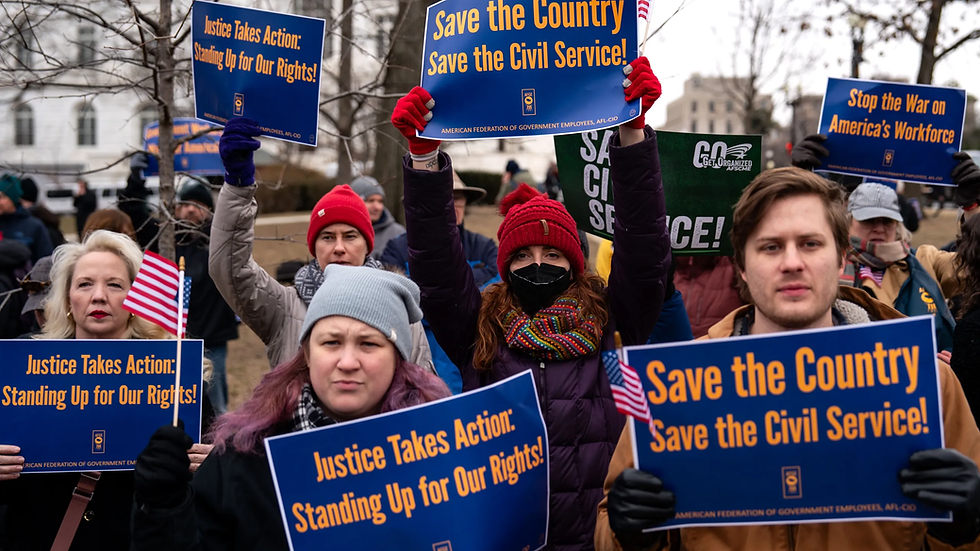The Power of Presidential Veto: Analyzing Andrew Johnson's Stand Against Reconstruction
- BusNewsNetwork
- Jan 24
- 4 min read

The period following the Civil War stands as one of the most chaotic times in American history. As the nation struggled to heal from the devastation of war and navigate the challenges of reintegrating Southern states, the question of how to rebuild the Union became crucial. At the center of this struggle was President Andrew Johnson, who faced tremendous pressure from Congress regarding Reconstruction policies. His veto of the Third Reconstruction Act on July 19, 1867, not only drew national attention but also ultimately led to his impeachment. This post explores the implications of this important moment in American history and examines the power of the presidential veto.
President Johnson viewed Reconstruction as an executive responsibility and blocked congressional initiatives;

After the Civil War, Radical Republicans in Congress and President Andrew Johnson disagreed over the terms and conditions for readmitting the seceded states to the Union. President Johnson viewed Reconstruction as an executive responsibility and blocked congressional initiatives. Congress sought to curb the power of the presidency, which had expanded in wartime, and took a less conciliatory stance toward the former Confederate states on issues of loyalty, governance, and the rights of black citizens. In 1867 and 1868 Congress passed four Reconstruction Acts over Johnson’s vetoes.
After the Civil War, the United States experienced deep divisions. The Southern states were in ruins, with their economies devastated and their social structures in disarray. The Reconstruction era aimed to heal the nation and rebuild the South, but disagreements over how to do so created intense conflict.
President Abraham Lincoln established the groundwork for Reconstruction with his Ten Percent Plan, which allowed Southern states to rejoin the Union once 10% of their voters swore allegiance. However, after Lincoln’s assassination, Andrew Johnson took the presidency. A Southern Democrat with a lenient approach, Johnson sought rapid reintegration of Southern states. His stance often clashed with the more radical elements within Congress, especially the Radical Republicans, who pushed for more stringent policies.
The Third Reconstruction Act
The Third Reconstruction Act, passed by Congress in March 1867, aimed at securing African American voting rights and establishing military control in the South. This act created five military districts, each led by a Union general, and required states to draft new constitutions that guaranteed suffrage for all male citizens, regardless of race, prior to rejoining the Union.
Johnson opposed the act, viewing it as an infringement on states' rights and believing it was too severe for the South. His presidential veto served as a critical flashpoint in the ongoing struggle between the presidency and Congress.

The Presidential Veto and Its Consequences
On July 19, 1867, Johnson vetoed the Third Reconstruction Act, asserting it was unconstitutional and overreached Congress's authority. He argued that states should independently determine their own reconstruction policies without military oversight. Johnson's veto highlighted his resistance to Congressional mandates and illustrated the growing divide between the executive and legislative branches.
Despite Johnson's discontent, Congress responded forcefully. Radical Republicans successfully overrode his veto, a clear demonstration of shifting political power and an indication of the genre's strength. Their ability to override a presidential veto is a rare occurrence in U.S. history, occurring only 4% of the time since 1789. Johnson's actions exacerbated partisan conflict, laying the groundwork for further confrontations.
The Impeachment of Andrew Johnson
Following his veto, the conflict between Johnson and Congress intensified, leading to his impeachment in 1868. Radical Republicans viewed Johnson as an obstacle to their Reconstruction vision. They charged him with violating the Tenure of Office Act, which restricted the president’s ability to remove certain officeholders without Senate approval. Even though this act was later deemed unconstitutional, it served as a catalyst for unprecedented congressional action against a sitting president.
Johnson's impeachment trial captivated the nation, revealing deep divisions within society. Ultimately, he was acquitted by a single vote, showcasing the contentious nature of his presidency and the delicate balance of power between different branches of government.

The Legacy of Johnson's Veto
Johnson’s veto carries significance that extends beyond its immediate political consequences. It exemplifies the complexities of the Reconstruction era and the ongoing challenges surrounding race relations in America. The veto also underscores the importance of the presidential veto power as a critical mechanism for maintaining the balance of power among government branches.
The tensions of this period set precedents for future confrontations between Congress and the presidency. Johnson’s bold refusal can be viewed as a precursor to later presidential actions that challenged legislative authority. Thus, the events of 1867 did not just impact the course of Reconstruction; they also established a narrative of executive overreach that resonates in today’s political discussions.
A Reflective Perspective
Andrew Johnson's veto of the Third Reconstruction Act marked a turning point in American history. It encapsulated a nation grappling with questions of identity, justice, and governance in the aftermath of the Civil War. The power of the presidential veto demonstrated in this instance remains a vital component of the checks and balances inherent to American democracy.
As we reflect on this momentous occasion, we understand that the ramifications of Johnson's decisions continue to echo today. The legacy of Reconstruction, along with the political struggles that followed, has profoundly influenced civil rights and governance in the U.S. By examining Johnson's veto, we can gain insights that may help navigate the complex landscape of American politics now and in the future. Understanding the delicate balance between power and responsibility during critical times sheds light on the historical precedents guiding the functions of government, reinforcing the importance of constitutional checks in building a just society.




Comments